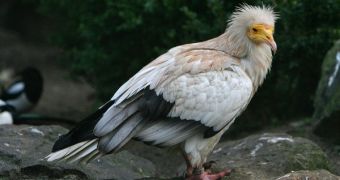The Egyptian vultures living in the Canary Islands were originally brought by the first humans who settled in, some 2,500 years ago, according to a recent study carried out by Spanish researchers.
The authors of the paper say that before the islands were colonized by humans, the food resources were extremely limited – only the remains of seabirds and sea mammals, or of rodents, so it would have been impossible for the vultures to survive.
“The introduction of new and abundant food sources by humans could have allowed not only colonization by vultures, but also their demographic expansion and their putative adaptation to the new island environment,” the authors added.
They actually conducted a genetic comparison of Iberian and Canarian birds and discovered that the Egyptian vulture population in the Canary Islands likely appeared nearly 2,500 years ago, at the same time as the first colonizations of the islands.
The genetic and morphological changes between 143 Iberian birds and 242 from Fuerteventura – one of the Canary Islands, were analyzed by Rosa Agudo along with a team of researchers from the Doñana Biological Station, Seville, Spain.
“We found that the island vultures are significantly heavier and larger than those from Iberia,” Agudo said.
“The establishment of this insular population took place some 2500 years ago, matching the date of human colonization.
“Our results suggest that human activity can trigger divergent evolution and that this process may take place on a relatively brief time scale.”
Since the Egyptian vulture is now globally threatened and classified as 'Endangered' on the IUCN Red List, it looks like 2,500 years ago, humans have actually made a good thing by bringing the species on Canary Islands.
The Egyptian Vulture (Neophron percnopterus) is a small Old World vulture, found ranging through southern Europe, Africa, the Middle East, and India.
It is the only living member of the genus Neophron, and it is also called the White Scavenger Vulture or Pharaoh's Chicken.
In the 20th century, there has been a decline in populations of this species, and there are some isolated island forms that are particularly endangered.
The current research was published in the open access journal BMC Evolutionary Biology.

 14 DAY TRIAL //
14 DAY TRIAL //